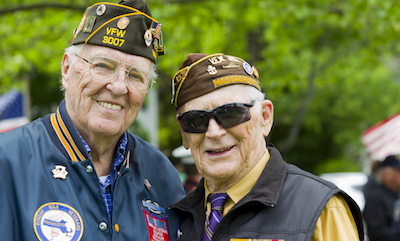Veteran-Directed Care Program Is Effective.
 The Veterans Health Administration (VHA)’s Veteran-Directed Care (VDC) program provides monthly budgets and counseling to veterans who need significant assistance with daily living, allowing them to hire personal care workers or family and friends as paid caregivers to help them continue living at home. The VDC program launched in 2009, and has proven very popular with veterans and their family caregivers, but is not yet operational nationwide.
The Veterans Health Administration (VHA)’s Veteran-Directed Care (VDC) program provides monthly budgets and counseling to veterans who need significant assistance with daily living, allowing them to hire personal care workers or family and friends as paid caregivers to help them continue living at home. The VDC program launched in 2009, and has proven very popular with veterans and their family caregivers, but is not yet operational nationwide.
Now, a study led by researchers from the School of Public Health and the Veterans Affairs Boston Healthcare System shows that the program is at least as effective as other veteran purchased-care programs.
The study, published in the June issue of Health Affairs, shows that, although the average VDC participant has more complex health burdens than veterans in other purchased-care programs, enrollees in both groups had similar hospitalization and cost trajectories.
“Given the popularity of this program, and our findings that enrollees have similar outcomes as enrollees in other programs, further expansion of Veteran-Directed Care may be justified,” says Melissa Garrido, research associate professor of health law, policy & management at SPH and associate director of the Partnered Evidence-Based Policy Resource Center (PEPReC) at the VA Boston Healthcare System.
The researchers used VHA data from fiscal year 2017 to identify 965 VDC enrollees, 21,117 veterans receiving other purchased-care services at VHA medical centers that offered VDC, and 15,325 veterans receiving other purchased-care services at VHA medical centers that did not yet offer VDC but were interested in implementing the program. The researchers then looked at VHA hospitalizations and related costs for all of these veterans in 2016 and in 2018.
They found that VDC enrollees were slightly younger than the other veterans on average, but that they also had more physical limitations.
Before enrolling in services, veterans who went on to enroll in VDC were more likely to be hospitalized than veterans who went on to receive other purchased-care services. Six months after enrolling in their respective service programs, VDC enrollees and enrollees of other programs had the same hospitalization rates.
The veterans who would go on to enroll in VDC also had mean monthly hospital costs about twice as high as the other veterans. One year after enrolling in their respective programs, the VDC enrollees’ mean monthly hospital costs were only 30 percent higher than the other veterans’ hospital costs.
However, when the researchers controlled for demographics, levels of care needed, duration of care, the biases of the data, and other factors, they found that changes in hospitalizations and costs were similar among VDC and other purchased care service enrollees.
The study was led by Yingzhe Yuan, a doctoral student and research assistant in the department health law, policy & management and a data analyst at PEPReC. The study was co-authored by: Austin Frakt, associate professor of health law, policy & management, and the director of PEPReC; Steven Pizer, associate professor of health law, policy & management, and chief economist of PEPReC; and Kali Thomas of the Providence VA Medical Center and the Brown University School of Public Health.